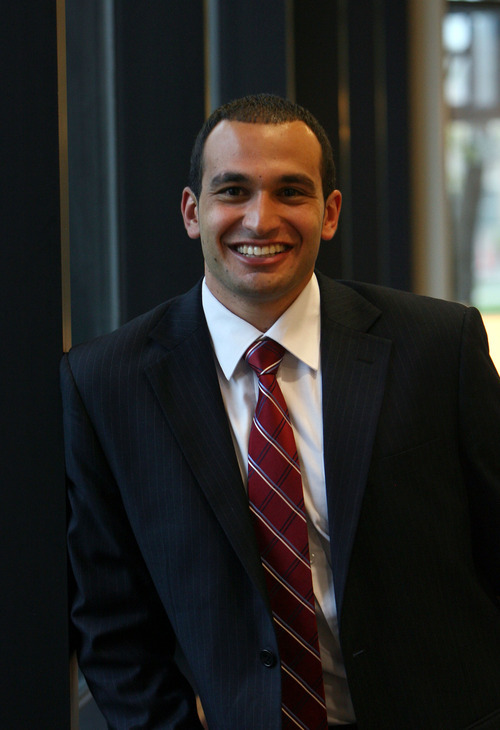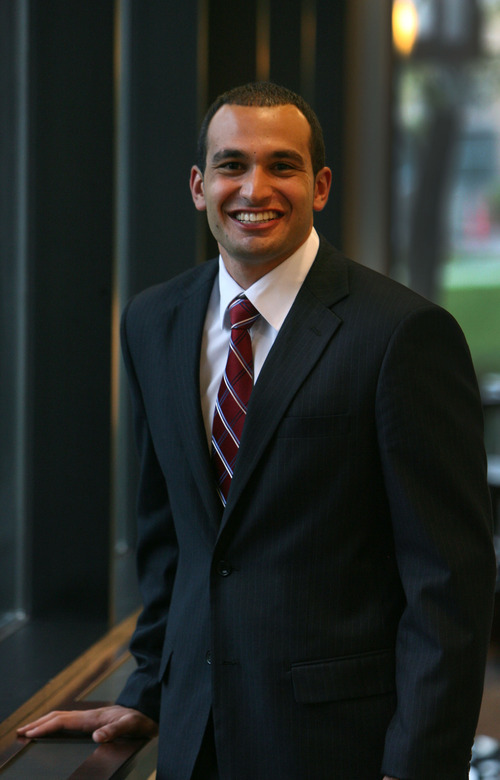This is an archived article that was published on sltrib.com in 2012, and information in the article may be outdated. It is provided only for personal research purposes and may not be reprinted.
Mustapha El Akkari knows what it's like to be an outsider — and he doesn't mind.
A Muslim, El Akkari has just become the first non-Mormon student-body president in the 57-year history of Brigham Young University-Hawaii.
The senior-to-be from Lebanon attended the LDS Church-owned school on a basketball scholarship and is studying business management. The Salt Lake Tribune interviewed him about his life and faith this week while he was in Utah doing an International Institute for Professional Protocol internship at Nu Skin in Provo.
What was your early life like, before you came to the United States?
I was born in Tripoli, Lebanon. I have an older brother, Mohammad, and younger sister, Sara. My parents are still alive, praise the Lord. Our neighborhood has pretty rough streets. It was a tough situation. Basketball was my life. It got me recognized. I played on a junior national team. In 2006, during the war between Lebanon and Israel, I was 16 and it was pretty bad. Then I got a phone call at 3 a.m. from an agent in Houston, Texas, who said he knew a coach who wanted me to play for him. I didn't speak a word of English. All I could say was yes. I got a visa, booked a ticket and, three days later, I was in Houston. It was pretty shocking to me. Here I was in America at a private Protestant school. I lived by myself in an apartment. The agent was very, very busy. I was short of money. I couldn't really contribute on the basketball court because of a lack of food — I was living off peanut butter — lack of sleep. I was pretty miserable.
How did that change?
I did that for about three months until I got into a host family. This woman kept asking me to move in with her family, but I refused. They were a half-Jewish/half-Christian family, and I had heard lots of stories back home. But the mother, Andrea, kept bringing me a lunch to school, washing my uniform. She said, "Just come one night to my house." It was the best thing I ever did. I got rid of my apartment and paid all my late fees. I never even knew I had them because I didn't speak English, and I never knew about mailboxes. She taught me how to read and write in English. She raised me again.
What about school?
I was going to Cypress Christian School. It was really a strict Christian school and they didn't want a Muslim student — even though I helped them earn a [championship] ring there. So I transferred to St. Pius X High School, which was Catholic. I earned a ring there, too. I played really good and I liked it. I was ranked in the top 30 high-school players in Houston. Many colleges recruited me, were interested in me, but I was short in credits because of my international experience. So I had to go to a junior college in Missouri. I didn't like it. It was a good place but, being a state champion in high school, I was expecting more. So I went back to Houston and lived with the family. I thought, "I'll just go home and make some money." Then BYU-Hawaii called me. I signed with them [on a one-year basketball scholarship].
What was your impression of the LDS Church-owned college?
It was a big shock for me. I read articles about it, but I thought it would be like a normal college. It was none of that. It was really straight with an honor code and all — no tea or coffee meant no tea or coffee. I had lived through a half-Jewish, half-Christian family but not Mormons. But I adjusted right away. I fit in. I'm a little unique — the only Arabic speaker or Lebanese on campus — but I love Hawaiians. I never knew any Polynesians before. I called my parents and told them there were islands in the Pacific where people live. They never knew it. I decided I was going to learn from the experience and bring my culture to them.
What about basketball?
I played my first year and my second year, and our team made it to the nationals. We earned an NCAA ring. I was getting more attached to BYU-Hawaii. But some conflicts happened between the coach and me during the [tournament]. When we came back, the coach took my scholarship away. I went back to Lebanon and wondered: What should I do? I got offers to play in a FIBA league. It was tempting. I prayed about it, but decided to come back to BYU-Hawaii with no scholarship. I came to practice and injured my right calf. I had to sit out two months. The trainer said she would get me back [in shape]. We were a championship team. "Just let me red shirt this year," I said. What can I do without basketball? I had spent from 2 p.m. to 7 p.m. every day in the gym. Now I was taking a step back.
What did you do next?
I was communicating more with my classmates. I applied for student vice president, which is not an elected position. They hire you and I got hired. I was the happiest man, taking opportunities when they came. The president of SIFE [Students in Free Enterprise] called me into his office and asked me to be the project manager to market a book. All this was happening in a short time. I decided, "Let me go for [student body] president." And I won. I feel like I'm hitting every shot I'm taking.
There are 76 cultures in BYU-Hawaii's 2,500 students. I want to be the guy who engages with them. I want to be taught and I can teach about my own culture.
How has being at BYU-Hawaii affected your faith?
Before I came to this school, I was not a practicing Muslim. I had never been to a Muslim school. When I came here, I saw all these religious people who were successful and I thought, "I want to be like them. I want to base my life on principles, you can't fail this way."
With all my respect for [Mormons], I know my religion is right. So I really learned about it, read a lot of Muslim books to educate myself. Now I read the Quran, do my five daily prayers and fast during the month of Ramadan. The Mormons kind of woke me up. I haven't felt any discrimination from them, but their attempts to convert me always will be there. They believe their religion is right. I don't really blame them.
What about the future?
I will graduate next April. I don't have the money for tuition right now — I'm short about $3,500 — but money is not a problem. It's one of those problems you face in life. You just keep going. You don't let money stop you. …
If I go back to Lebanon, I want to play basketball. It's great money, easy money, doing this thing you really love. … My brother just made it into [the record books] by scoring 113 points in a single game, playing in Lebanon.
On the other hand, I am so in love with the business world. My major is investment finance and supply-chain management. I like working with great people, all these big names like Stephen R. Covey. It's kind of motivating me. I like that kind of guy. I am that guy outside the basketball world. It feels great doing it, when you see people's life changing. I take the principles I learned on the court and apply them off the court. I am starting to write a book about it.
What about your social life?
I haven't dated in a long time; I need to step it up. But it's a challenge at BYU-Hawaii. I would definitely prefer a same-religion girl.
Facebook.com/religiongal
Twitter: @religiongal





